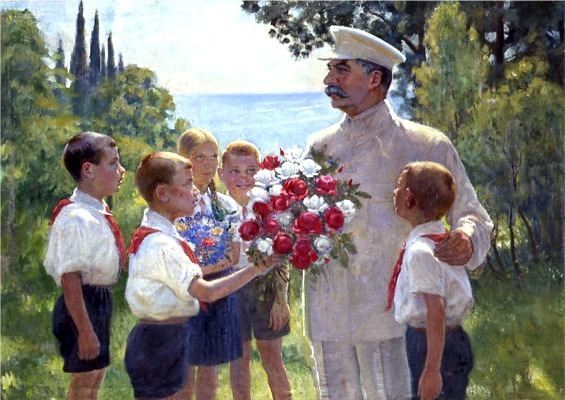Between dodge ball and insect safaris, we used to tell Polish jokes, Newfie jokes—without context, without malice. We thought that newfie or polack must mean contemptible and nothing else…What a polack thing to do! Most of these jokes had interchangeable butts. There was a bizarre one about Italian cowardice, a holdover from more categorical times that had cocooned itself in the playground gravel to rise again for post-boomers to hear and make of what we could. The Italian tank with five gears—all of them reverse. Madame Beauchamp’s eyes ballooned as she confiscated my sketch of it. I’d seen a tv special on the war and drawn Mussolini sitting on the hatch, ass-backwards with a bottle of wine, watching his contadini get crushed under the tread.
After
I never heard the Poles defamed again until I taught business English for Electrolux in
The fifteenth floor was pure 80’s power office, all sleek blues and greys, needlefelt carpeting, roaming coffee trolleys and everyone smoking ha-ha-ha round the cooler. On the walls were framed vintage Electrolux ads to provide them with metanarrative. The 50’s housewife in full skirt grinning at her two-tone appliances. Pumps, outboard motors, luxomatic push-button vacuums sweeping up decades of dust: Nothing Sucks Like Electrolux. A man’s professional phone-voice boomed out in decent American English: “They have bought 12,000 H45-K’s…they will sell six! They have no idea what is going on. I told them to stop the lying. I said ‘Stop lying and pretending you understand what your job is and then I can start telling you what you're here for. Once we know that, we'll get back to selling because this is a business for the sake of Jesus!”
The accent, definitely not Polish, was hard to place. His voice trailed off as I got further away. The boardroom had a beech oval table and flipboard. I sat in a leather executive chair and reviewed my lesson. Verbs of motion: come, go, leave, arrive. To, in, at, towards. To is a preposition, come is a verb. Repeat after me: "To! Come!" I waited but no one came. A woman poked her head in the door, saw me, inhaled sharply and retreated. I was glad about not having to go through with another miserable grammar lesson, but then again I didn’t know what to do. Petty thoughts passed through my mind. Should I call my school? How long did I have to stay before leaving? Was I going to get paid? At last I packed up and headed for the elevator. On the way, passing the same office, I looked in and our eyes met. He was a heavyset blond man in a slate grey suit. When he saw me in my jeans, oversized shirt and long hair, he didn’t know what to make of me.
“And you are…?” he asked, as if addressing an invasive species.
“I’m the new English teacher,” I said. “I…my class was supposed to be in room 1501.” He cocked his head. “But there must’ve been a mix-up because nobody...came.” He shot a black look at his desk. Lifting his finger to keep me waiting, he called up underlings to report later for a bollocking. Smiling, he invited me into his office.
“You are an American?”
“Canadian, actually.”
Wistfully: “Ah…
“Oh, you’ve been?”
“No. Cancelled several fishing trips, though. Cigarette?” He flipped open a cedar box full of those Pure Virginia brown-paper cigarettes you pass by at duty-free shops. I took one and so did he. It was so strong I smoked it like a cigar until I left it to burn out in his crystal ashtray.
“I must apologize for my employees not turning up,” he told me. “Perhaps you’ve been here long enough already to know how hard it is to motivate them.”
“Well, this is my first day here….”
He smiled benignly. “No, please, what need you to cover up for them? There are historical circumstances, I would not deny it. But as we say in
“I admire you but I don’t envy you,” he said. “A teacher in this country. And the stage is set for success, and the Polack needs English to connect with the rest of the civilized world, and here you are, ready to give it to him for practically nothing.” I laughed nervously. He swivelled in his chair to look down on the city.
“Polacks. Lazy. Drunks. Idiots. Stalin was a thug but he said out loud what otherwise can only be said in children’s games.” He swivelled back to me and stood to see me to the door. His bad mood was gone. “Nice to have met you. Hmm…Canadian. Fish?”
“Sorry?”
“Do you fish?”
“Not really.”
“That’s too bad.” He looked me up and down. “Well, you won’t find it so bad here. The Polish girls are very Catholic—they’ll do whatever you want. Time goes by fast, enjoy yourself. Easier to teach English than the Protestant work ethic!”



